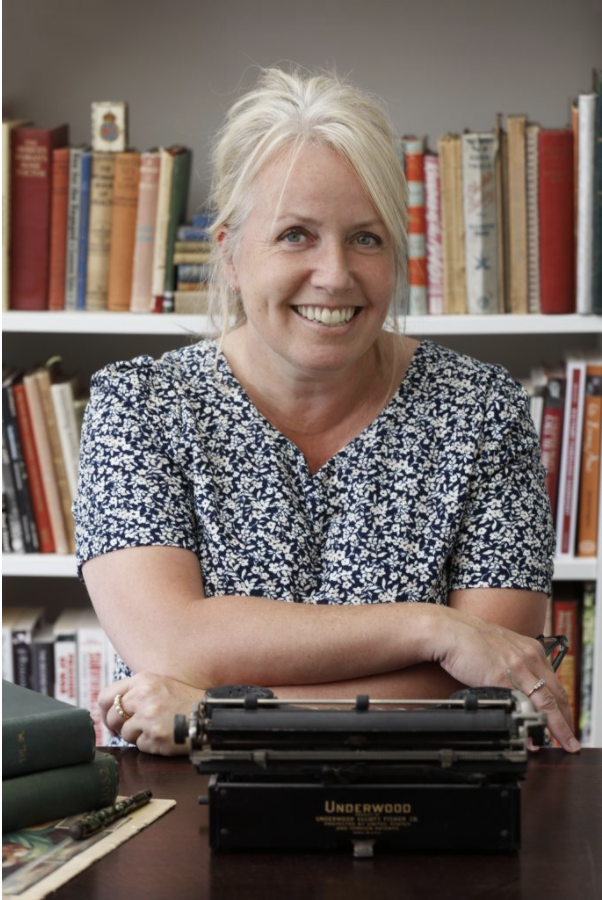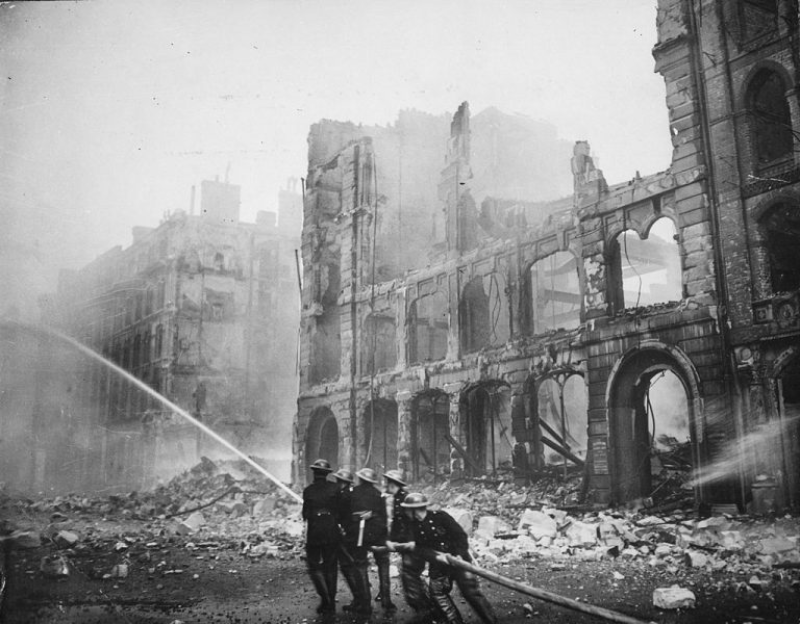Dear Mrs. Bird: An Interview with AJ Pearce
Dear Mrs. Bird, one of the twelve titles chosen by Bas Bleu’s editors for our Summer Reading Collection, initially was pre-selected for our upcoming Book a Month 2020 package. But we couldn’t wait that long to share this sparkling novel with you! Penned by debut novelist AJ Pearce, Dear Mrs. Bird follows Emmy Lake as she chases her dream of becoming a reporter…all the while trying to stay positive (and alive!) in London during the Blitz. This week, we’re chatting with Pearce about the impulse buy that inspired her novel, the crucial role of female friendships in women’s lives, and the importance of optimism even in the worst of times.
Novelist AJ Pearce (photo credit: Alexander James)
Bas Bleu: Dear Mrs. Bird is your debut novel. Have you always been a writer? If so, was writing a novel always your goal? Or did the idea for this specific story open up a literary ambition you hadn’t anticipated?
AJ Pearce: I loved writing when I was a child, including some truly awful poetry in my teens (!), but during college and my early career, I wandered away from it. Then, about fifteen years ago, I was looking for an evening course— just for something to do really— and heard about a weeklong writing course. I went along and loved it. The tutors were hugely encouraging and I decided I wanted to try to write a novel.
I carried on writing as a hobby, going to seminars and short courses for several years, but finding the wartime women’s magazine was the catalyst in terms of taking it seriously.
BB: You’ve said you were inspired to write this story after finding a women’s magazine from the 1930s. Tell us more about that. What was the thought process like that carried you from “oh, look, an old magazine” to “wow, this is so interesting, this should be the plot of my first novel!”
AJP: When I saw a 1939 copy of a British weekly women’s magazine, I bought it out of curiosity. But when I began reading it, I really did have an instant response of wanting to write about that world. I’ve always loved magazines, and the format hasn’t really changed: fiction, fashion, articles, food, and problems were key elements in 1939 and still are in many magazines now. It was like looking through a window onto very familiar scenery, but from another era. Every letter on the problem page was a story in itself. I started to collect more vintage magazines and when I found some from the 1900s where the advice tended to be rather tougher than by the 1940s, it gave me the idea of bringing an old-fashioned advice columnist into the “modern” world of 1941. That was how the idea for Dear Mrs. Bird began.
Firefighters (like the ones Emmy works with in DEAR MRS. BIRD) work to extinguish a fire ignited by an air raid during the Blitz (circa 1941).
BB: No city in the continental United States has withstood prolonged bombardment by enemy forces since our Civil War. So it’s difficult for most Americans to comprehend what it was like to try and carry on a normal life in London during the Blitz. How deliberate were you about setting your story against the backdrop of the Blitz? What role did you want it to play in Emmy’s story?
AJP: When I started collecting magazines, they ranged from the nineteenth century through to the 1960s, but it was the wartime magazines that really stood out. The problems women faced were a combination of ones we can all relate to—relationships, families, jobs, etc.—but alongside some of the most life-changing challenges that could only happen during a war. The bravery and stoicism of women was astonishing.
I set Dear Mrs. Bird in the Blitz because it was a time when every single person—men, women and children—had to “do their bit.” The women had to attempt to run their homes, families, and jobs while London was being bombed day and night. Normal people had to be heroes. At the same time, if you are lucky enough to speak with people who remember the war, they are very un-showy about things. They just got on with it. My parents grew up in London (and also were evacuated to other areas) during the war, and it has been a wonderful opportunity to talk to them in greater depth about their experiences.
BB: There were plenty of men living and working in London during the war. Yet with one or two exceptions, Emmy’s story focuses on her female relationships—with her best friend Bunty, with her mother, with her female coworkers, even with Mrs. Bird. What can we learn from women’s experience during the war that we perhaps cannot learn from men’s?
AJP: I wanted to write about characters I felt I could understand and identify with. I can understand Emmy’s hopes and dreams, and what is important to her. The main thing, though, is that while Dear Mrs. Bird is set in the Second World War, at its heart it is a story about female friendship and how you stick together and get each other through whatever happens.
It’s a theme I think is as relevant now as then. Friendship may not be as passionate or conflicted a relationship to write about as, for example, romance or families, but I think it’s fascinating. For many people, they may have a best friend longer than any other major relationship in their entire life. My mother has known her best friend for over seventy-five years—that’s incredible.
BB: Emmy’s persistent optimism is astonishing, especially considering the times she was living in. Do you think her optimism survived the novel intact, or was it tempered by her professional and personal experiences over the course of the story? Is there benefit to be gleaned from tempered optimism, or is undiminished optimism in the face of life’s challenges the greater victory?
AJP: I hope Emmy’s optimism will always survive. If you don’t have optimism and hope, how can you keep going through the very worst of times? The key thing with Emmy and her friends is that they aren’t just optimists. They do everything they can—even though they are young people without any personal influence or power—to contribute to the war effort, and to live and enjoy their lives, whatever happens.
BB: What’s the best piece of advice you’ve ever gotten from an advice column?
AJP: What a great question! Probably some of the beauty advice from the 1940s. I read that if you have fat arms, you should wave them around your head like an aeroplane propeller. I have no idea if it works, but just trying it makes me laugh.
BB: Which book(s) from your childhood helped to shape the person you are today?
AJP: I was a total bookworm as a child, particularly pony stories. I didn’t have my own [pony] so I lived through books. I loved British writers like the Pullein-Thompson sisters and Ruby Ferguson, but I think reading in general taught me the joy of being able to escape through words.
BB: Which books are you quick to recommend to other readers? Who are your favorite authors?
AJP: I read a lot of novels by authors who were writing in the 1940s. I always recommend D. E. Stevenson for clever, funny British novels such as Miss Buncle’s Book [a Bas Bleu favorite]. Also Winifred Watson’s Miss Pettigrew Lives for a Day. In terms of modern authors, recently I have loved debuts by Elizabeth Macneal (The Doll Factory) and Candice Carty-Williams (Queenie).
BB: What future projects can our readers look forward to seeing from you?
AJP: I am working on the sequel to Dear Mrs. Bird at the moment, so I really hope readers will enjoy Emmy and Bunty’s world and look forward to reading more!
BB: Thank you, AJ Pearce, for taking the time to talk to us about Dear Mrs. Bird. We look forward to following Emmy into her next chapter!

